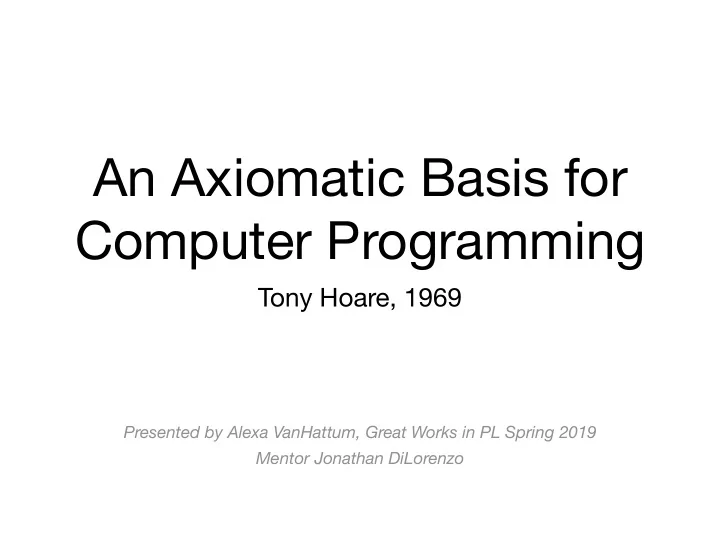

An Axiomatic Basis for Computer Programming Tony Hoare, 1969 Presented by Alexa VanHattum, Great Works in PL Spring 2019 Mentor Jonathan DiLorenzo
software bugs are bad manual testing is not enough formal reasoning is better
Motivation “Computer programming is an exact science in that all the properties of a program and all the consequences of executing it in any given environment can, in principle, be found out from the text of the program itself by means of purely deductive reasoning.”
Historical Context “Assigning Meaning to Programs” Robert Floyd, 1967
Historical Context “Assigning Meaning to Programs” Robert Floyd, 1967 “If the initial values of the program variables satisfy the relation R 1 , the final values on completion will satisfy the relation R 2 ”
The Strategy bricks? cement? bra.org economictimes.indiatimes.com rebelwalls.com Deductive Rules Axioms Theorems
Hoare’s contribution
Precondition Program Postcondition If P holds and Q executes and terminates, then R holds
Valid Hoare Triples? true {x := 1} x = 1 ✅ x = 0 {x := x + 1} x = 1 ✅ x = n {x := x * 2} x = 2n ✅ false {x := 1} x = 0 ✅ x > 0 {while x > 1 do x := x + 1} x < 1 ❌ x > 0 {while x > 1 do x := x + 1} x = 1 ✅
Hoare’s Axioms Overflow? Integer arithmetic That depends! 1. Strict interpretation 2. Firm boundary 3. Modulo arithmetic Assume 1 or 2 for now
how do we apply this reasoning to programs? axiom schemas!
Assignment
Assignment ❌ x = 0 {x := 1} ? x = 0 {x := 1} (x = 0)[1/x] x = 0 {x := 1} 1 = 0 ❌
Assignment ✅ ? {x := 1} x = 1 (x = 1)[1/x] {x := 1} x = 1 1 = 1 {x := 1} x = 1 true {x := 1} x = 1 ✅
Assignment
Consequence
Composition
Iteration
Iteration x > 0 {while x > 1 do x := x + 1} x = 1
Iteration consequence rule ¬(x > 1) ∧ x > 0 ⇒ x = 1 x > 0 {while x > 1 do x := x + 1} ¬(x > 1) ∧ x > 0 x > 0 {while x > 1 do x := x + 1} x = 1
Iteration iteration rule x > 0 ∧ x > 1 {x := x + 1} x > 0 x > 0 {while x > 1 do x := x + 1} ¬(x > 1) ∧ x > 0 x > 0 {while x > 1 do x := x + 1} x = 1
Iteration consequence rule x > 0 ∧ x > 1 ⇒ x + 1 > 0 x + 1 > 0 {x := x + 1} x > 0 x > 0 ∧ x > 1 {x := x + 1} x > 0 x > 0 {while x > 1 do x := x + 1} ¬(x > 1) ∧ x > 0 x > 0 {while x > 1 do x := x + 1} x = 1
Iteration assignment rule x + 1 > 0 {x := x + 1} x > 0 x > 0 ∧ x > 1 {x := x + 1} x > 0 x > 0 {while x > 1 do x := x + 1} ¬(x > 1) ∧ x > 0 x > 0 {while x > 1 do x := x + 1} x = 1
Iteration How do we find P? Can we automate it?
Extension to Hoare Logic: Separation Logic • Extends Hoare logic to include reasoning over shared data • Separation conjunction * : P * Q asserts P and Q hold for separate regions of The frame rule (when c does not memory modify the free variables of r)
Application of Hoare Logic www.microsoft.com
Conclusion • Relate deductive reasoning to programs via Hoare triples • Formalize/automate axiomatic reasoning via rules • Enable pen-and-paper proofs and automated reasoning tools • Axioms can leave aspects of the language undefined
Conclusion “The practice of supplying proofs for nontrivial programs will not become widespread until considerably more powerful proof techniques become available, and even then will not be easy. But the practical advantages of program proving will eventually outweigh the di ffi culties, in view of the increasing costs of programming errors.”
30 years later…
“Researchers into formal methods […] predicted that the programming world would embrace with gratitude every assistance promised by formalization to solve the problems of reliability that arise when programs get large and more safety-critical […] It has turned out that the world just does not su ff er significantly from the kind of problem that our research was originally intended to solve.” - Tony Hoare, 1996
Recommend
More recommend